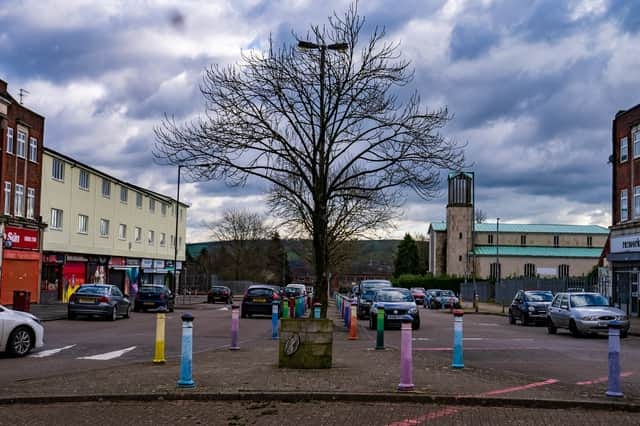#Bristol's Green Zealots Declare War on Parking: Filwood Businesses Under Siege!
From Fish & Chips to Piercings: Bristol Council's Traffic "Solutions" Strike Again!
(Image - Bristol City Council)
Bristol! City of vibrant street art, questionable public sculptures, and a council so dedicated to "sustainable transport" they'd pave paradise and put up a bike lane (thanks Joni Mitchell for the inspiration). First, they descended upon Barton Hill, those brave souls, with their "traffic calming" measures that calmed nothing but the local chippy's profits. Remember the cries? The wails of "but where will my customers park their battered haddock-mobiles, and “Can we now have our Friday night suppers delivered by drones?" Ignored, of course.
Then, Park Street, that hallowed haven of independent retail, was subjected to the Green Inquisition. Now, Filwood Broadway, that bastion of working-class grit, is next on the chopping block.
Soniya Zellinger, proprietor of Piercings 4 U, a business that bravely adorns among the city's finest with metal, has launched a petition. And rightly so! "Catastrophic," she declares, and who are we to argue? After all, who's going to get their eyebrow blinged if they can't park within spitting distance?
"As a trader on Filwood Broadway, I and a lot of the shops have huge issues with the new proposed road changes, cycle path and restricted parking, which will have a catastrophic impact on our businesses," Zellinger lamented on the Filwood Residents Association Facebook group, a digital haven for the disgruntled.
"My fears with a cycle path being put in on the Broadway are that it will be a complete death trap. Do they not think the youths will use this on their bikes, scooters, etc, as a rat run?" she added, clearly picturing a Mad Max-style biker gang tearing through the newly laid tarmac. Which, let’s face it, is entirely possible nowadays.
And let's not forget the parking. "Us as traders will have nowhere to park," Zellinger wailed, a sentiment echoed by The Sandwich Stop, who fear their bacon butty empire is about to crumble. "These new road restrictions will have a massive impact on our businesses as well as residents parking outside their homes," they said.
The council, in their infinite wisdom, claim this is all part of a £30m "regeneration" project. Apparently, "regeneration" now translates to "annihilate local businesses and replace them with cyclists." They say this is paid for by, and I quote, "£2,156,918 in Government Levelling Up funding and £1,490,000 in council funding." One must ask, leveling up for whom? The lycra-clad, youth-ridden, electric bike, substance dealers and other community misfits? Meanwhile, £1,490,000 spondoolies of what’s essentially council taxpayers ‘ hard-earned could be invested more usefully in social services, as a, ‘for instance’.
So, there you have it, folks. Bristol's Green council, on a mission to turn every street into a cyclist's paradise, one disgruntled trader at a time. What’s next, I wonder, to turn the harbourside into a giant, floating bike rack?
Watch out, Southmead, Withywood, Brentry, and Shirehampton. You know, anywhere in Bristol where there’s a large estate that relies on local, essential community services, such as shops, our beloved council seems solely focused on hitting the lower council band residents, the hardest.
Bristol, that shining beacon of eco-conscious governance! Where the Green dream manifests as meticulously pruned shrubbery in leafy Clifton, while the working class, nestled in the housing estates of Barton Hill and Filwood, discover the true meaning of "sustainable living." Why invest in frivolous things like thriving local businesses—Hamblins' fish and chip shop in Barton Hill, Filwood's vital piercing artistry, or the bustling Park Street traders—when you can instead cultivate a biodiverse collection of potholes and a flourishing ecosystem of shuttered shopfronts? It's all about priorities, darling: ensuring the hedgehogs of Redland are impeccably housed while the human residents of larger estates can bravely face the challenges of a "re-wilded" local economy.
Indeed, the Green administration's commitment to equality is truly something to behold. They've masterfully democratised suffering, ensuring that the burdens of their progressive policies are distributed with admirable impartiality towards those least equipped to bear them. After all, what's a small matter of a chippy closing, a piercing parlour vanishing, or a sandwich shop's demise when compared to the glorious spectacle of a cycle lane that stretches, unused, towards the horizon, a monument to visionary urban planning? And should those working-class folk dare to complain about the disruption to their communities, they'll simply be reminded that their sacrifices are contributing to a greener, more virtuous Bristol—a city where the air is pure, the cycle paths are pristine, and the only sounds are the distant sobs of displaced small business owners.


